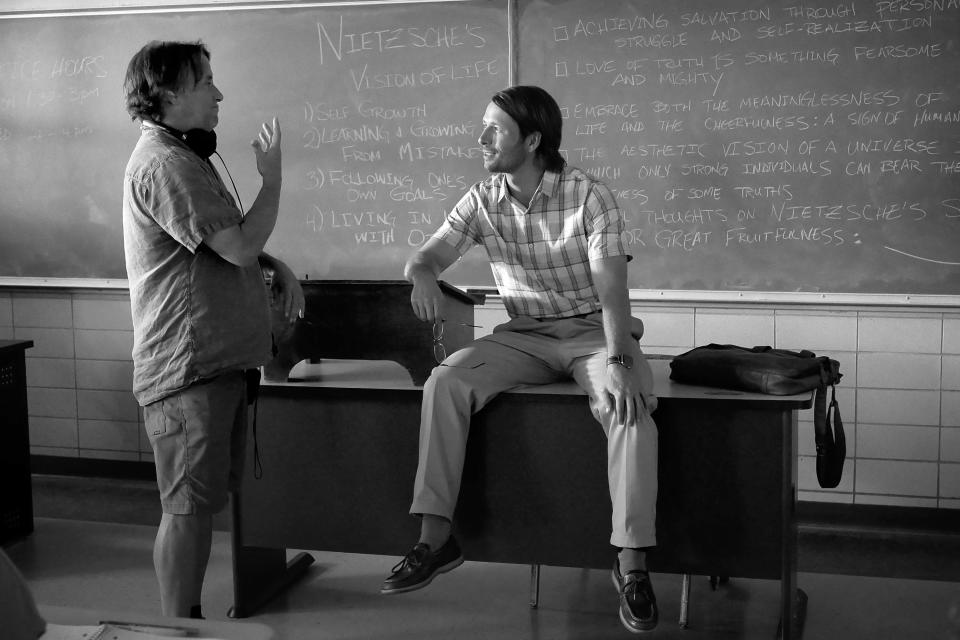About That ‘Hit Man’ Surprise Ending: Richard Linklater Explains Why It Was ‘Inevitable’

[Editor’s note: The following article contains spoilers for the ending of “Hit Man.”]
“Hit Man” debuted on Netflix as #1 on its most-watched list, which means the ending may have shocked millions of people this weekend. After all, it’s not exactly a staple of the romantic comedy that the couple the audience is rooting for kills a cop in order to be together. But that’s “Hit Man,” a film that cross-pollinates a sexy screwball comedy with a noir like “Double Indemnity.”
More from IndieWire
The film is sort-of based on a true story, although the real Gary Johnson (Glen Powell) didn’t kill anyone. However, director Richard Linklater told IndieWire that once he and Powell (they co-wrote the screenplay) came up with that ending, it was never really questioned.
“I think the ending has to be inevitable,” said Linklater. “And it’s kind of the thesis of the movie.”
As the end credits detail, the real-life Johnson did work with the police and disguised himself as various hitmen to entrap would-be clients, but he never killed anyone. Johnson also never dated someone who tried to hire one of his pretend hitmen, but he did let a woman off and encouraged her to leave her husband and start a new life. That anecdote from the Texas Monthly profile of Johnson (which Hollywood struggled for 20 years to adapt, including Brad Pitt, who at one point wanted to play Johnson) served as Linklater and Powell’s jumping-off point.
“The article ends when he lets her off,” Linklater said. “What if she got back in touch with him? Or what if they start hanging out? What if they start dating and she thinks he’s Ron [Johnson’s fake hit man]? It becomes this study of self, who are we, and that it’s funny — there’s lot of mistaken identities, a lot of deception, and that’s just fun to watch. But there’s also a true-crime element. I like that she thinks he’s a hit man, and her husband ends up dead after all.”
For Linklater, maintaining that balance was key. Once they began to raise the stakes of the crime story, the ending came early in the writing process.
“The walls start closing in on this couple and Gary really doesn’t know what’s going on. It gets truly dangerous, so I wanted both: I wanted it to be this love story, a fun thing, but then it’s like, ‘Oh, shit, this just got really real,'” said Linklater. “It sort of fulfills [the] dark comedy, the trajectory of character. It’s a study of passion [and] the guy who said, ‘I could never get worked up enough to kill or die for anything.’”
The real-life Johnson, like his character in the film, was a student of human behavior, a professor and Jungian scholar. Early in the film, Gary is fascinated how love and hate get so mixed together that the people trying to hire him want a lover murdered. He remarks he is somewhat jealous, noting he isn’t capable of such passion.

What Linklater loved about the story’s mistaken identity element was seeing Gary forced to test his capacity for such passion. When Gary becomes the far more confident Ron and meets his lover Madison (Adria Arjona), we start to see the cracks. As Gary/Ron passionately makes love to Madison, his narration reads:
“I was once told I think too much to be a good lover. She said exceptional sex requires a lack of thought, a certain amount of animal abandon. I liked Ron. He wasn’t a thinker. He was a doer. So, I don’t know if I was just better as Ron, or it was that electric charge going through both of us. I mean, after all, in her mind, she was having sex with someone who had murdered a bunch of people, and I was having sex with someone who was clearly capable of having a lover killed. I’m not proud to say this, but it upped my game.”
It’s the first in a string of scenes while portraying Ron, and falling for Madison, that Gary discovers people do have the capacity to change their personalities.
“So when he takes on adult passion, love, sex, and all that, he makes himself vulnerable in the world,” Linklater said. “By the end of the movie, he’s pretty far from that guy at the beginning who said that. So [the murder] is the full-circle element. It’s commitment. It’s that point in ‘Double Indemnity,’ two people get on a train, and that train ends at the graveyard. They’re committing to each other. So again, dark, kind of funny, inevitable, and it’s kind of the thesis of the movie.”
Best of IndieWire
The 14 Best Thrillers Streaming on Netflix in June, from 'Fair Play' to 'Emily the Criminal'
Unsimulated Sex Scenes in Film: 'Nymphomaniac,' 'The Brown Bunny,' 'Little Ashes,' and More
Every Palme d'Or Winner from the Cannes Film Festival, Ranked
Sign up for Indiewire's Newsletter. For the latest news, follow us on Facebook, Twitter, and Instagram.

 Yahoo News
Yahoo News 
